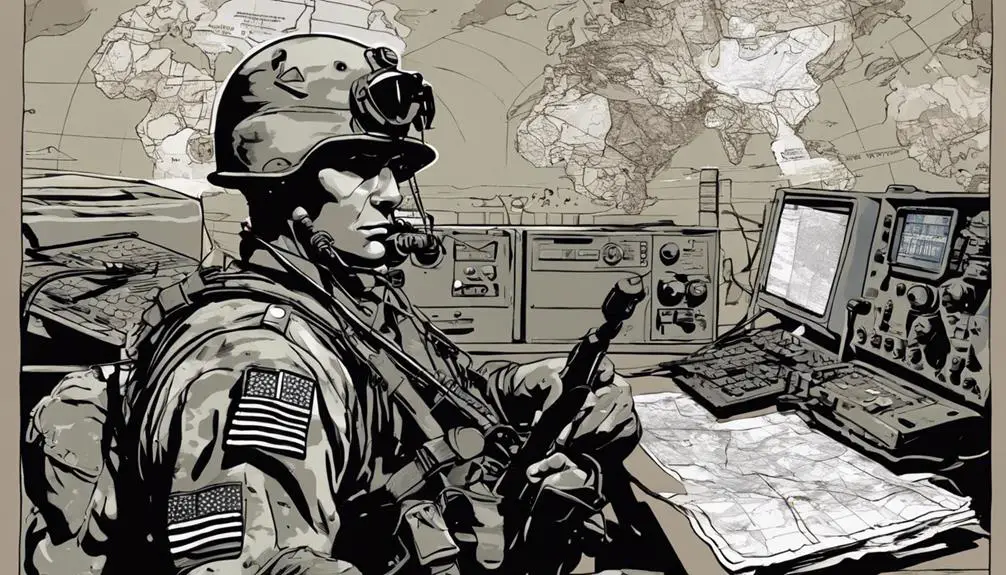You've likely heard military communication lingo, where phrases like 'Bravo Zulu' and 'Oscar Mike' convey clear messages. In high-stakes situations, understanding common military alphabet phrases and slang terms is essential for effective communication. From the phonetic alphabet to military time and dates, radio communication essentials to common slang terms, these phrases simplify complex ideas and establish camaraderie. Familiarizing yourself with terms like 'Rack' for bed or living quarters and 'Squad' for team or unit can also help. As you explore these phrases and terms, you'll gain a deeper understanding of military communication and its nuances.
Phonetic Alphabet Basics
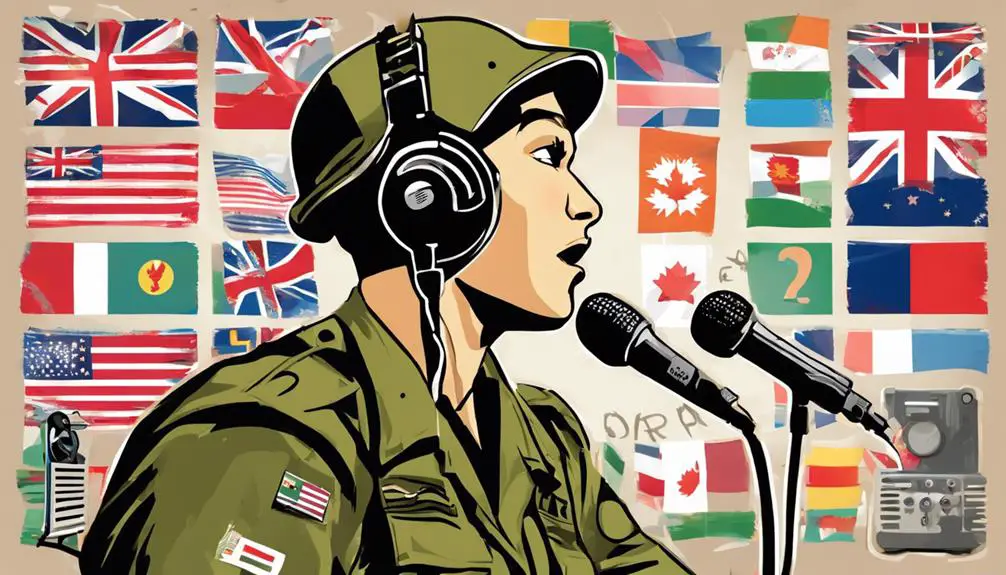
When communicating critical information over radio or phone, you rely on the phonetic alphabet to clearly convey letters and numbers, preventing costly misunderstandings. This standardized system guarantees accurate transmission of information, especially in high-stress situations.
But have you ever wondered where this alphabet originated? The phonetic alphabet, also known as the NATO phonetic alphabet, has its roots in the early 20th century. Initially developed for radio communication in the 1920s, it was later adopted by the International Civil Aviation Organization (ICAO) in the 1940s. The ICAO standardized the alphabet, which was then adopted by NATO in the 1950s.
Despite its widespread use, there are common misconceptions about the phonetic alphabet. One common mistake is thinking that it's only used by the military. However, it's used by various industries, including aviation, maritime, and even customer service. Another misconception is that it's only used for spelling out words. In reality, it's used to clearly convey individual letters and numbers, reducing errors and confusion.
Military Time and Dates
Get familiar with military time and dates, as you'll need to convey precise schedules and deadlines in high-pressure situations. Understanding military time is vital, as it's used universally across the military to avoid confusion. Military time is based on a 24-hour clock, where 12:00 AM is 0000 hours, 1:00 AM is 0100 hours, and so on. This system eliminates the possibility of confusing AM and PM.
When it comes to dates, the military uses a standardized format: Day-Month-Year (DD-MM-YY). This format ensures clarity and consistency across all communications. You'll often see this format used in conjunction with Zulu Time, also known as Coordinated Universal Time (UTC).
Zulu Time is the primary time zone used for military operations, and understanding how to convert local times to Zulu Time is crucial. By mastering military time and dates, you'll be able to effectively communicate critical information and promote seamless coordination with your team.
Radio Communication Essentials
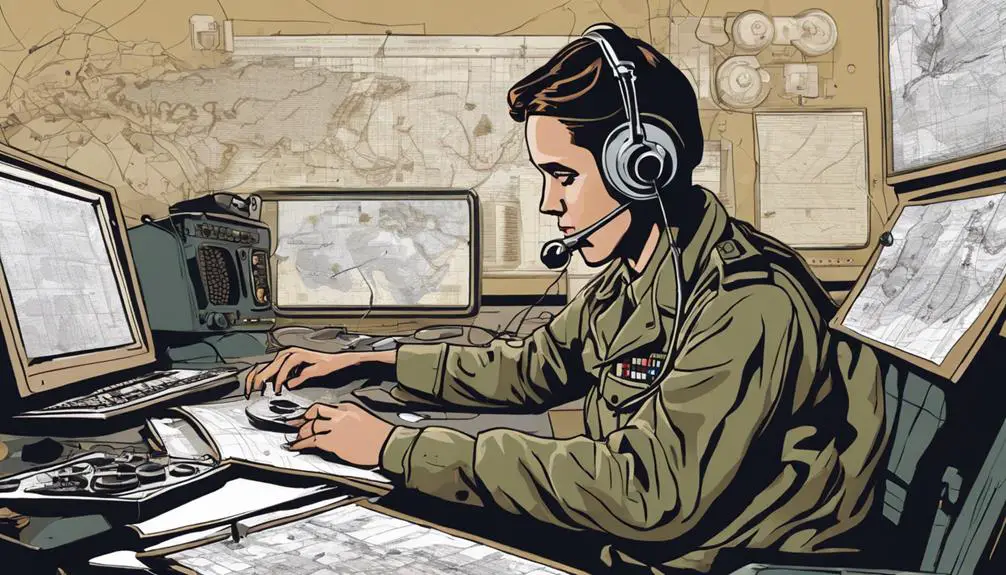
You'll rely on radio communication to convey critical information in the heat of the moment, so mastering the basics is essential to effective teamwork. When operating a radio, you'll need to follow established communication protocols to guarantee clear and concise transmission of information.
This includes conducting regular Radio Checks to verify your signal strength and clarity. During these checks, you'll use standardized phrases like 'Radio Check' or 'How Copy?' to confirm that your message is being received clearly.
When transmitting, use a clear and concise tone, avoiding unnecessary information or jargon. Identify yourself with your call sign or unit designation, and state your message clearly and briefly. Use proactive listening skills to ensure you understand the transmission, and ask for clarification if needed.
Remember to use established communication protocols, such as 'Over' to indicate the end of your transmission, and 'Out' to signal the end of the conversation. By following these guidelines, you'll guarantee effective radio communication that's critical to successful missions.
Common Military Slang Terms
Familiarity with common military slang terms is essential to effective communication, as it enables you to quickly understand and respond to critical information in high-pressure situations. In the military, slang terms are used to simplify complex ideas, establish camaraderie, and even add some humor to an otherwise intense environment.
When you're immersed in barracks life, you'll hear slang terms being thrown around left and right. From referring to the mess hall as the 'chow hall' to calling your living quarters the 'rack,' these terms will become second nature.
Here are a few essential slang terms to get you started:
- 'Rack' – your bed or living quarters
- 'Chow hall' – the mess hall or dining facility
- 'Squad' – your team or unit
Mastering these slang terms will help you better navigate barracks life and communicate effectively with your fellow service members.
Operational and Tactical Terms
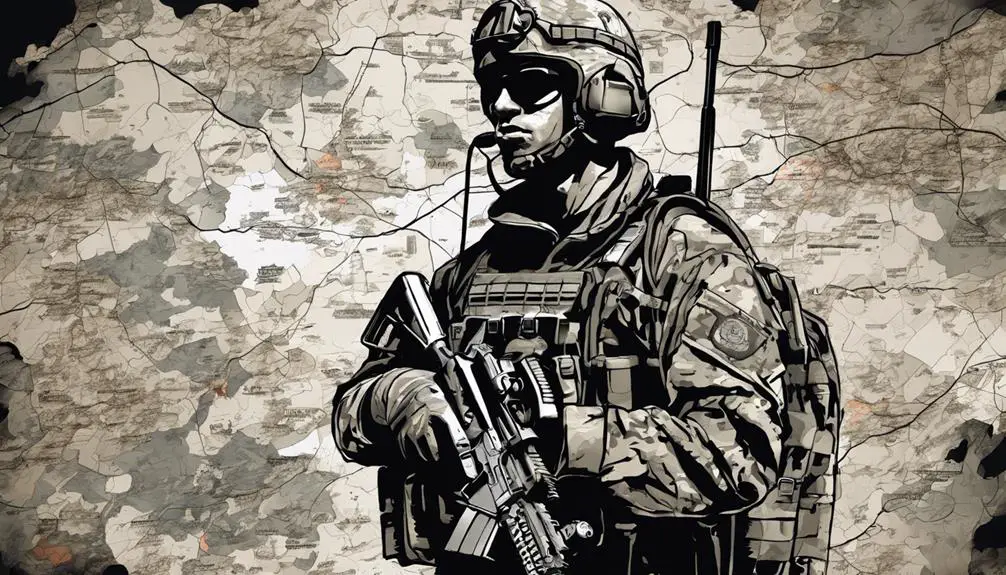
In high-stress operational environments, you'll frequently rely on tactical terms to convey critical information swiftly and accurately. These terms are vital for effective communication, ensuring that you and your team can respond quickly and decisively in high-pressure situations. Familiarity with operational and tactical terms is essential for success in combat zones, where clear communication can mean the difference between life and death.
Battle Drills, for instance, refer to standardized procedures for responding to specific scenarios, such as ambushes or IED attacks. You'll need to understand these drills to react quickly and effectively in emergency situations.
Firefights, on the other hand, refer to intense, close-quarters battles that require rapid decision-making and precise communication. Understanding these terms will enable you to provide critical information, receive orders, and execute maneuvers with precision and speed.
Mastering operational and tactical terms will enhance your ability to operate effectively in high-stress environments. By learning these essential terms, you'll be better equipped to communicate effectively, respond to threats, and achieve your mission objectives.
Military Ranks and Titles
Military personnel rely on a clear understanding of ranks and titles to maintain chain of command, delegate tasks, and communicate effectively in the field. You need to know who's in charge and who's responsible for what. Ranks and titles are critical in establishing respect, discipline, and order.
As you navigate the military hierarchy, it's vital to understand the differences between commissioned and non-commissioned officers.
Here are some key points to keep in mind:
- Officer Etiquette: Addressing officers by their title and last name (e.g., Captain Smith) is crucial in maintaining respect and discipline.
- Rank Insignia: Recognizing rank insignia on uniforms helps you identify an officer's rank and respond accordingly.
- Chain of Command: Understanding the chain of command helps you communicate effectively and follow protocol when delegating tasks or reporting incidents.
Slang for Military Equipment
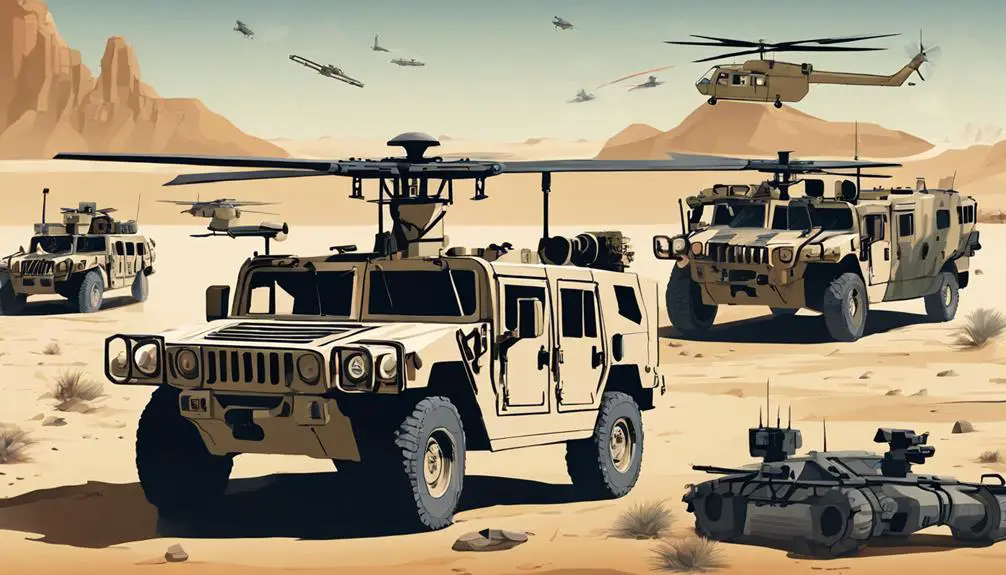
You'll often hear military personnel referring to their gear using colloquialisms and abbreviations that might leave you puzzled if you're not in the know. Familiarizing yourself with these slang terms can help you better understand military lingo. Here are some examples:
| Equipment | Slang Term | Description |
|---|---|---|
| Tanks | "Abrams" or "Leo" | M1 Abrams tank or Leopard tank |
| Machine Gun | "Saw" | Squad Automatic Weapon (M249) |
| Rifle | "M4" or "Carbine" | Standard-issue rifle (M4A1) |
| Helicopter | "Helo" or "Bird" | General term for military helicopters |
Tank nicknames, like "Abrams" or "Leo," are commonly used to refer to specific tank models. Weapon acronyms, such as "Saw" for the M249 machine gun, are also widespread. By learning these slang terms, you'll be better equipped to understand military conversations and communications.
Frequently Asked Questions
Are There Any Military Slang Terms Specific to Certain Branches?
As you explore military slang, you'll find that each branch has its unique lingo.
For instance, Navy Lingo is filled with nautical terms like 'deck' for floor and 'head' for bathroom.
Meanwhile, Army Jargon is more ground-focused, with terms like 'hooah' for yes and 'FOB' for forward operating base.
You'll discover that each branch has its distinct flavor of slang, shaped by its specific mission and culture.
Can Military Slang Be Used in Formal Writing or Reports?
When writing formal reports, you should avoid using military slang to maintain a professional tone. While slang might be acceptable in casual conversations, it's important for formal writing.
Stick to a formal tone and use professional language to guarantee clarity and respect. Save colloquialisms for informal settings, and opt for standardized terminology in official documents to convey authority and expertise.
Do Military Slang Terms Change Over Time or Stay the Same?
As you explore the world of military slang, you'll find that language adaptation is a constant process. The evolution of slang is a natural phenomenon, driven by cultural and environmental factors.
You'll notice that terms and phrases emerge, evolve, and sometimes fade away as new generations of service members bring their experiences and perspectives to the forefront.
This dynamic nature of slang guarantees that it stays relevant and effective in communication, even as the military landscape changes.
How Do Military Slang Terms Differ Between Countries?
As you explore the world of military slang, you'll discover that differences in terminology know no borders. Cross-cultural comparisons reveal that international dialects are shaped by unique histories, cultural nuances, and operational environments.
You'll find that British military slang, for instance, is heavily influenced by colonial heritage, while American slang is deeply rooted in its melting-pot culture.
As you investigate further, you'll uncover a fascinating world of linguistic diversity that reflects each nation's distinct military identity.
Is Military Slang Used Only for Communication or Also for Camaraderie?
You might think military slang is just for communication, but it's more than that. It's a bonding mechanism that fosters a sense of social identity among service members.
It's a way to express emotions and share experiences that civilians can't fully understand. Military slang has cultural significance, conveying a sense of belonging and camaraderie.
It's not just about conveying information; it's about building connections and expressing yourself in a unique way that only those who've served can truly understand.
Conclusion
You've now mastered the basics of military communication, from the phonetic alphabet to operational terms.
Remember, 'knowledge is power,' and understanding these phrases and slang terms can be a crucial tool in your arsenal. Whether you're a seasoned veteran or just starting out, speaking the language of the military can give you a competitive edge.
Stay informed, stay alert, and stay ahead of the curve.

